For a while now, I’ve been blogging about megagames I’ve attended, and the ones I designed. But I have a ton more blog ideas that cover megagames as a whole. So consider this the start of a new series on the genre of megagaming.
So you want to be a megagamer? Not just a sit-in-the-background ignore-the-aliens stay-unmarried don’t-go-to-war megagamer, but one of the ones whose anecdotes will be told across the world, whose mere name will strike fear into the hearts of opponents and excitement into the hearts of teammates.
Well, I can’t tell you how to be the best megagamer ever, but I can give you some tips on how to get the most out of megagaming. It all comes from anecdotal experience with other players, and the ways I believe I’ve improved as a megagamer since I first started. YMMV.
Note: if you’re a first time megagamer, try reading my 7 Things I Wish I’d Known Before My First Megagame, over on the Megagame Assembly site.
1. Put yourself out there
You only get back from megagames what you put in. If you shy away from getting involved in major events, or don’t talk to people much, you’re less likely to be involved in the really cool stuff.
This is probably the thing that’s hardest to do when you’re a new player. It requires a certain amount of confidence, to be able to go up to people you don’t know and put plans you’re unsure about into motion. Luckily the megagaming community is super welcoming, and Control are always very encouraging of new players’ ideas.

Example
My first megagame was Renaissance and Reformation, and my role was as Queen Mother of France. This was quite a good first role for me, as my entire game revolved around marrying off my family members. Rather than sitting at the team table waiting for suitors to come to me, I identified who was responsible for marriages on the other teams and sought them out, and had made probably around 30 matches by game close.
Action
If you’re not doing something, go and talk to someone. It doesn’t particularly matter who it is, even.
2. Be creative
Try and think as your character. If there’s an action that, in real life, you would be able to take, you probably can – just make sure to run it past control.
Don’t just do the obvious thing. If your role is as a major diplomat, and you’re briefed that X Country is a lifelong ally, then by all means go and speak to them… but don’t ignore the other countries. They may just be friends you haven’t met yet.
If you’re the mayor of a city and you have some cash burning a hole in your pocket, rather than spending it on beefing up the police force, you could look into throwing a parade, even if it’s not in the rules.

Example
At the first run of City of Shadows, I was leader of a gang called the Griežti Vaikinai, or Tough Girls. I’d originally decided to go in a very feminist direction, and not run any prostitute rackets. But my first meeting of the game was with Judge Jeffries, who I knew would be a useful ally. He misunderstood the meaning behind our cover story – that we were Lithuanian seamstresses running a completely legitimate business – and before I knew it, I was back at the table telling my girls to invest heavily in “broads”. Doing something like this wasn’t anywhere in the rules, but it was totally a legitimate thing we could do in-universe, so Control let us roll it through.
We kept the Judge supplied with women, and before I knew it my sister was running mate in his bid to be mayor, and he and I were having a very public affair (which I made sure to keep the press appraised of, see habit #6). If it hadn’t come out that he had a wife and kids, we could have ridden that ticket right to the Mayor’s office…
Action
Think twice before committing to an obvious course of action. It might be the most sensible one, but is it the best?
3. Be flexible
Your plans won’t always go to plan. Sometimes you’re even given objectives you can never hope to achieve, and you need to react positively when you need to change tack part way through.
Going into a megagame with a firm plan is a great way to end up disheartened part way through. It’s fine to brainstorm ideas, and come up with a few different ideas, but remember that chances are they won’t live beyond the first turn.
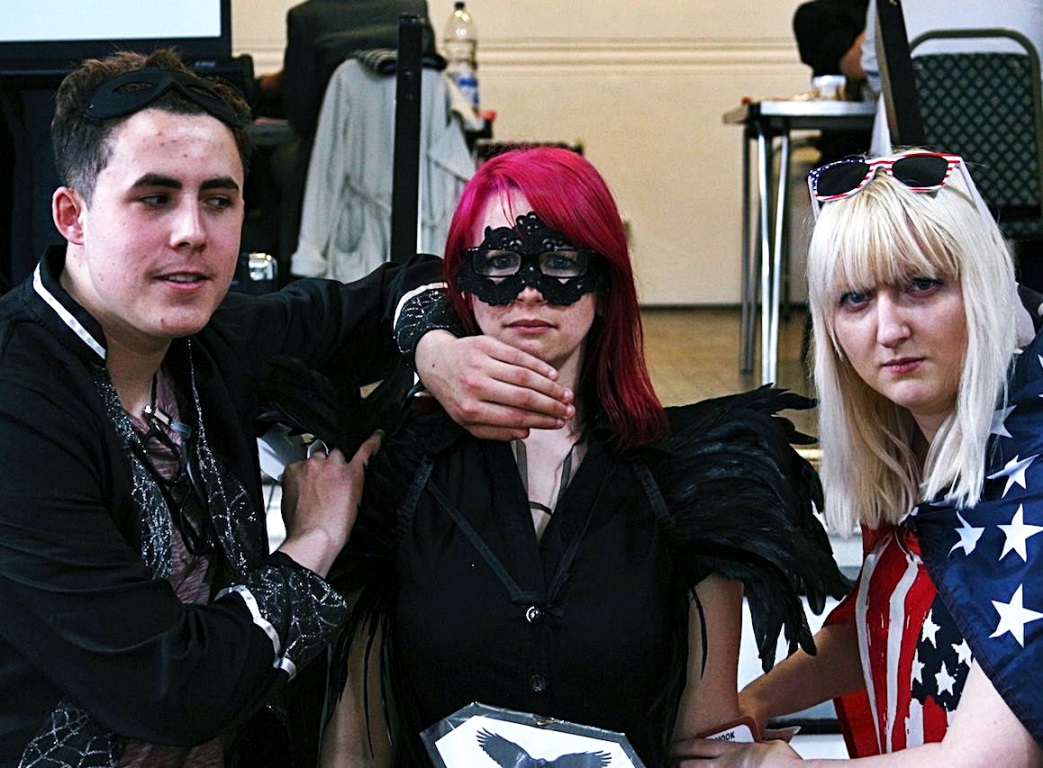
Example
At Not Over By Christmas, the Cold-War-gone-hot megagame, I was head of NATO’s command team. We spent the planning phase determining three battle lines that we wanted to hold – where we estimated our troops would get to by the end of deployment, a line we could fall back to after which we’d start considering nuclear options, and a line where we would absolutely nuke if they got beyond.
Well, they pushed us back to the second line by the end of turn 1, and clearly we couldn’t start talking nukes straight away. So we had to do some pretty hefty re-evaluating of our resources and realistic expectations. Unfortunately that final line – the nuke-beyond one – wasn’t really set by us. France had told us that if the Soviet troops crossed the Rhine, they would go nuclear, so a key part of our new plan involved finding out exactly how flexible they planned to be with that ultimatum.
Action
If When your plans fall apart, don’t stress or sulk. Just take a moment to think through your available options – there are always options.
4. Use your cards
Action cards, opportunity cards, item cards… they feel like precious resources that you must save for the most important moment of the game.
But chances are, you’ll finish the game holding most of what you started with. This is dreadful – NEVER finish a game holding any of your cards. NEVER hold them back too long. Play them at the first opportunity where they’d make sense!
If you run out of cards, this is a great opportunity to use habit number 2. Think what was on those cards, and how your character may have obtained them in the first place. If you come up with a good enough story, Control may even give you them back to play again!
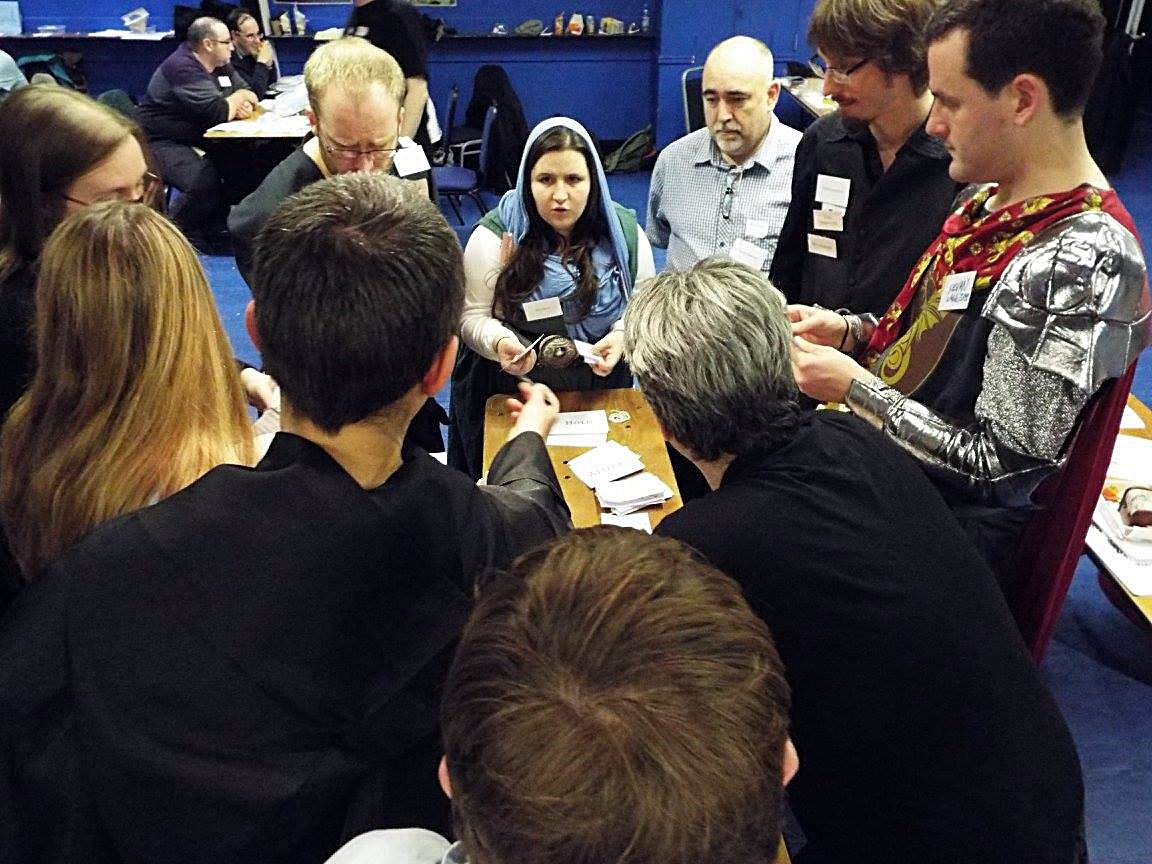
Example
At City of Shadows 2 earlier this year, when I played a masked vigilante, I started the game with a hand of item cards I could use in fights. Most of them we could get back, but some, such as smoke bombs, were discarded after use. I threw as many of them as I could into every single fight from turn one, and wow did it make a difference. Vigilantes were pretty unstoppable with just their basic stats, but with those cards the regular units didn’t stand a chance.
The reputation this gave me across the game was very useful towards the end, because players had to come up with more creative ways to outwit me. And it encouraged me to be more thorough when a few of us were ganging up on Hero By Night, because we knew she’d have something sneaky up her sleeve.
Action
Play those cards. Now.
5. Play your briefing
Step one: read your briefing and game handbook. Read them a few days before the game, again the evening before, and again the morning of. (This is advice I totally need to listen to as well).
Step two: embrace the constraints of your briefing. Maybe you would never deal with a Catholic. Maybe you are totally committed to defending every inch of West Germany, regardless of the practicalities.
You may think that this conflicts with habit #3. After all, I just hammered in how important it is to be flexible. But it makes for a far more interesting game, for yourself and your fellow players, if you can be flexible on some aspects but absolutely resolute when it comes to certain moral standards.
To that end, read materials around the topic of the game. Wikipedia is a good place to start, especially for a historical game when you’re playing a real person. Watch films and TV shows around the topic, and ask the game designer what inspired her to create the game.
Remember not to get too caught up in what your character really did, if they’re a historical figure. Use your knowledge about the setting and the constraints of your character to enhance, not preclude, your creativity.
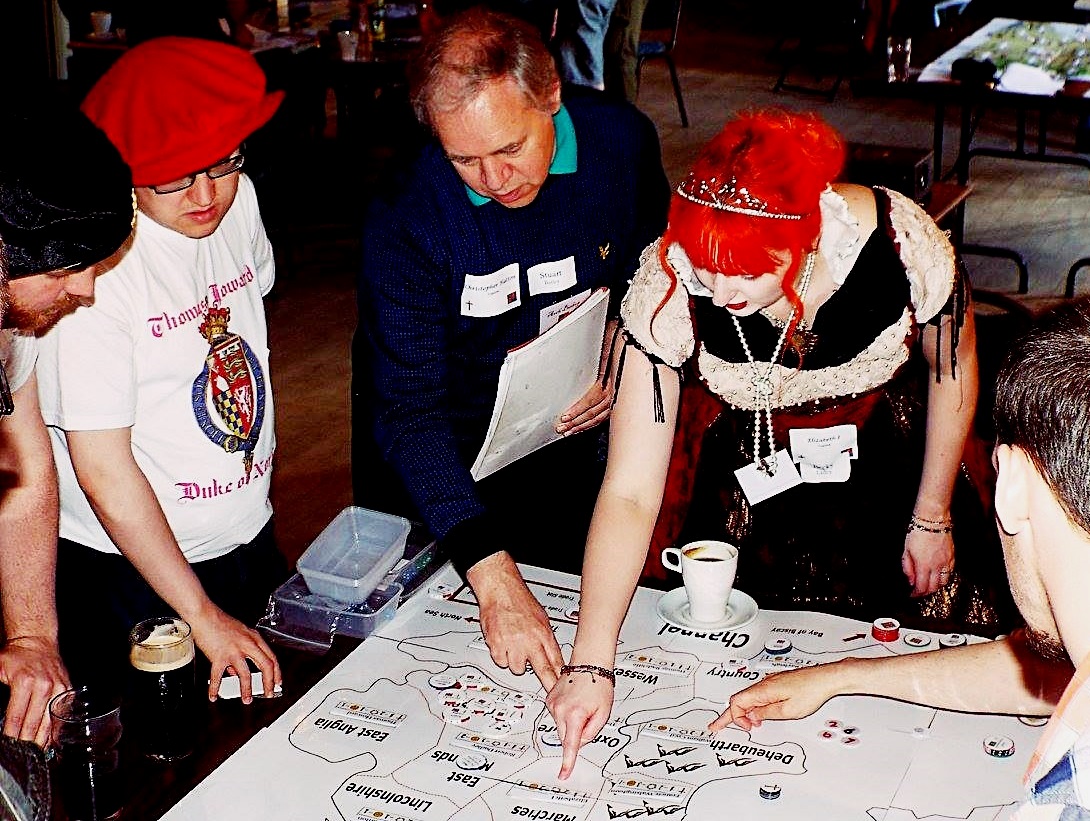
Example
At Foxes and Devils, the 2017 rerun of Renaissance and Reformation, I was cast as Eleanor Hapsburg of Austria, sister to the Holy Roman Emperor. When Henry VIII tried to divorce my aunt, many of the other players didn’t grasp the full implications of this. However, historically the Hapsburgs kicked off massively and even kidnapped the Pope to make sure he couldn’t agree to the annulment. So I fought back against the English, and several players commented that my actions made the game considerably more interesting for them.
Action
Read the wiki page for your next historical megagame, and start thinking about what sort of actions make sense in that world that wouldn’t necessarily make sense in this one.
6. Talk to the press
Okay, I’m biased because my early megagame background was as the Queen o’ Press.
Press have a direct line of communication to almost every player in the game. If you want a good in-game rep, they’re the people you want to have on your side.
If you’re wondering how to get your name on the front page… wonder no longer, just go and ask them! Press are always very busy, and they will happily prioritise stories that come to them, rather than ones they have to chase. Don’t nag them, but whenever you do something particularly notable, make sure the guys with the circulation channels hear about it. And don’t lie to them – see habit 7.
Press can also make a world of difference to how you’re remembered post-megagame.

Example
At Urban Nightmare Redux (a Leeds run in 2016, not the recent Wide Area Megagame), I headed up a three man press team. While the zombie situation went… interestingly, the real fight was between the State Governor and the City Deputy Mayor. Unfortunately for Governor Firefly, Deputy Banderas had been buddying up to the Press since the start, and even helped secure us passage out of the overrun city. It turned out that yes, the press can totally be bought… when their lives are at stake!
Action
Make friends with the Press in turn one and drop them a tip whenever you can.
7. Volunteer to Control
Controlling a megagame is a very generous thing to do for the community, and will often earn you tons of good will. But it’s not just about that.
Once you’ve been control, you understand megagames in a different way. Control really aren’t there to screw you over, they’re there to facilitate your enjoyment of the game. And acting as Control in just one game will massively help with habits 1 and 2, as you’ll see first hand how other people player well… and badly.
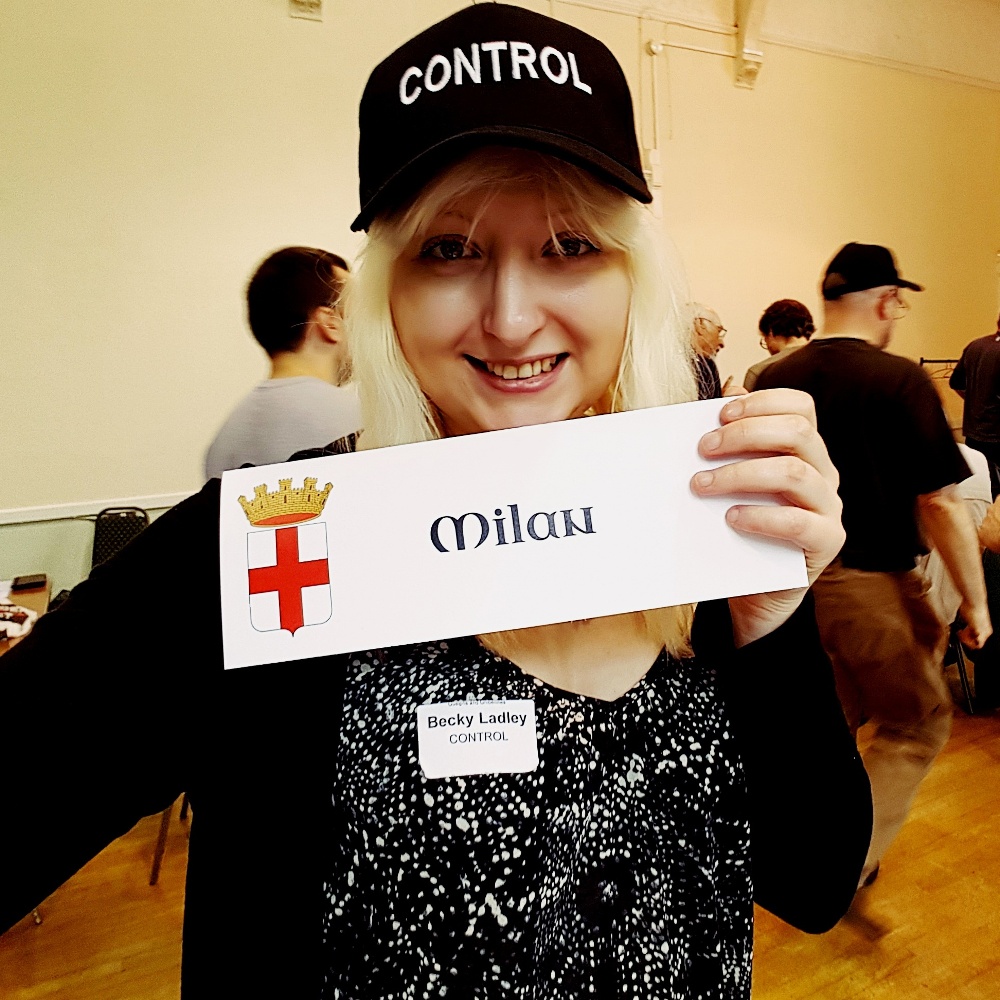
Example
My most testing experience as Control was at 1866 And All That. It was my second time as Control, and it was honestly one of the most stressful experiences of my life. I struggled with the rules, and had quite a few new players at my table. They were more used to board games, and weren’t fully on-board with “Control’s word is final, even if it contradicts the rules”.
I ended up shouting at a player and felt terrible. But then we picked up and moved on, and the second half of the game was much more positive. I learned that Control are under immense pressure during games, and why it’s so important to not opinion farm or derail the game, even when you think a Control ruling is unfair. They do a crucial job to hold the narrative of the game together.
Action
Volunteer to control at one of your upcoming games.
BONUS HABIT 8. It’s not just about you
This is the most important point. If you take anything away from this blog, take this.
You are one of many many players here today. You are not the most important person in the room.
Megagames are cooperative games, fundamentally. You may be competing against other teams or team-mates for resources or prestige, but you’re playing WITH everyone as well. There’s almost certainly diplomatic reasons to not be a complete dick to the competing teams. And there’s never a reason to be a dick out of character.
If the players around you aren’t having fun, no one will want to talk about that awesome thing you did.
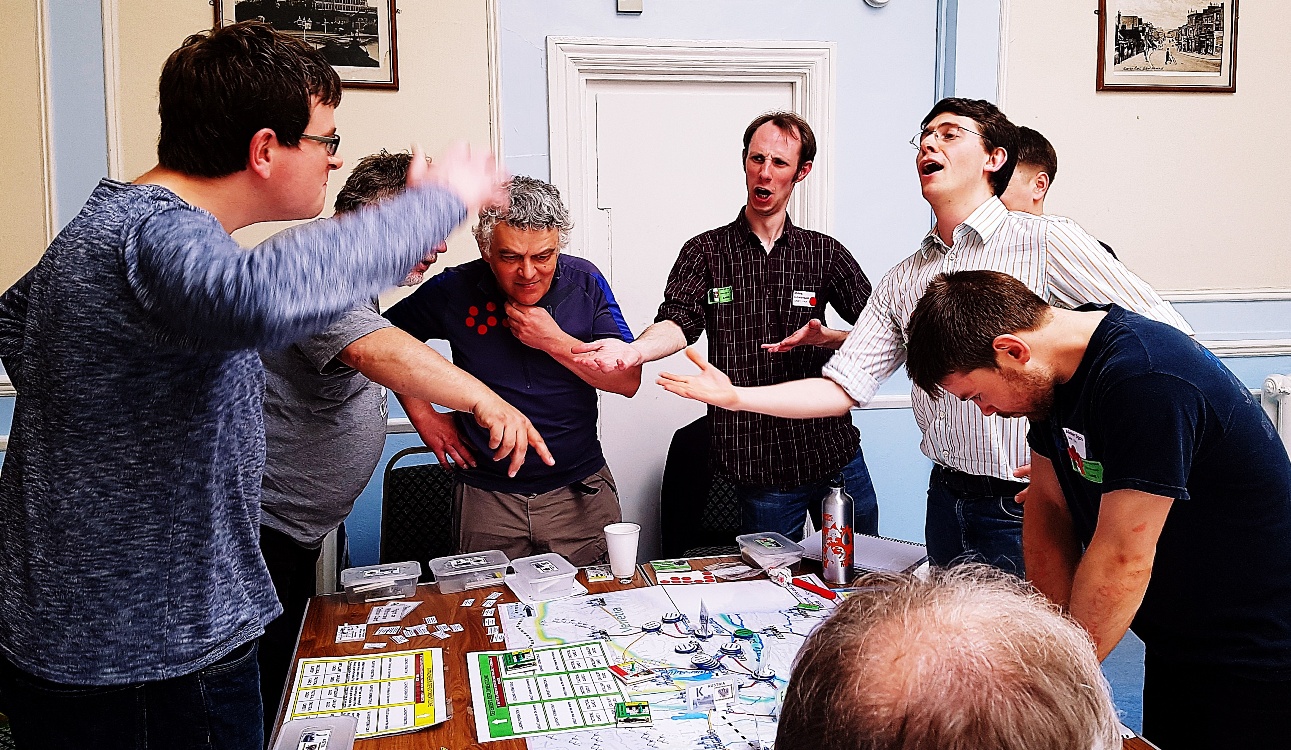
Examples
Rather than pick on people who’ve behaved badly at megagames, here’s some examples of activities to avoid:
- Trying to be the centre of attention.
- Doing everything yourself as team leader. Not giving your teammates the power to make decisions on your behalf when it makes sense.
- Talking over people, interrupting them and not listening.
- Lying. Yes, lying can often be very beneficial in a megagame… but use your judgement. In-character lies are fine, but out of character ones are a different ballpark. Absolutely never lie to Control, and don’t OC lie about something Control has said.
- Control farming, or debating points with Control. Control are volunteering their time to facilitate, and their word is final.
- Letting in-character aggro spill over into out-of-character aggro. Remember, it’s only a game.
- Cheating. Yes, some people fudge dice rolls and nick other players resources. This is all round douchey behaviour.
Action
Be a good sport. Remember that the spirit of the rules is more important than the letter of the rules.
How do you rate in each of the seven habits? Can you think of any other skills that awesome megagamers often have?
Thanks to Tim Campbell for bouncing around ideas and suggesting habits 3 and 5!
